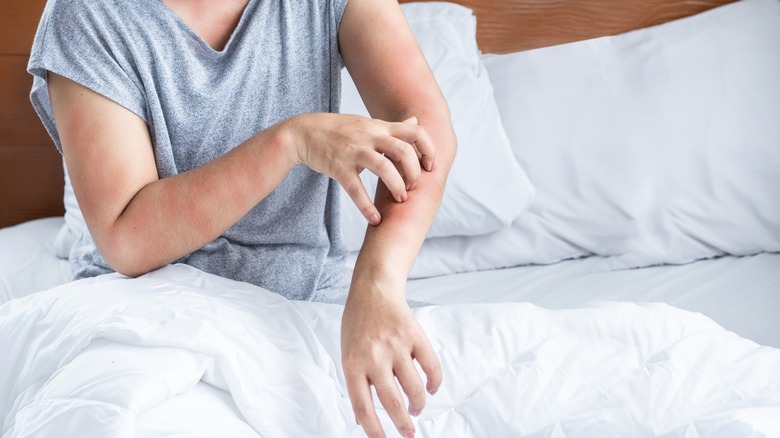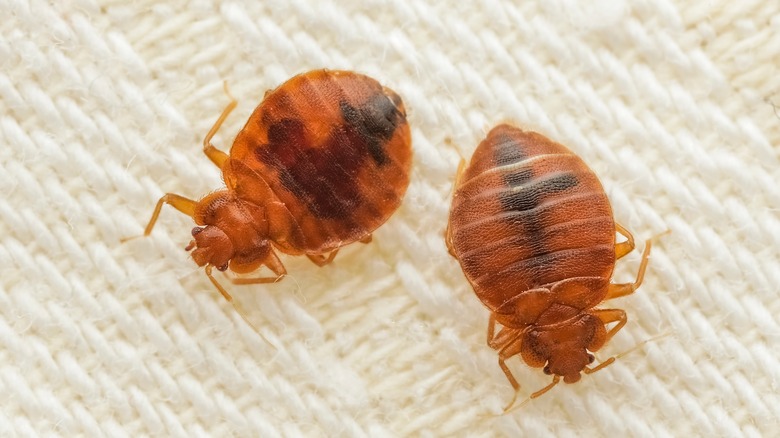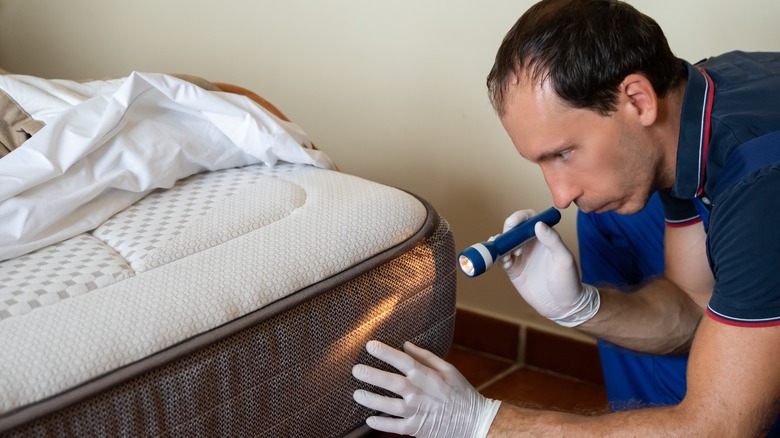Can You Kill Bed Bugs With Hydrogen Peroxide? Think Twice Before You Try
Few things can strike terror into your heart quite like the realization that you have bed bugs. Not only do the little pests cause itchy rashes, but they're also notoriously difficult to get rid of. While bed bugs thankfully don't spread disease, that doesn't mean you want them hanging around. There are a variety of myths and tricks for how to get rid of bed bugs, but many should be avoided because they are ineffective or even dangerous. One popular tip is to use hydrogen peroxide to eradicate the pests. While hydrogen peroxide applied directly to a bed bug will kill it, this isn't a practical or effective way to deal with a bedbug infestation.
There are a variety of pest control hacks using hydrogen peroxide. While it can be a fantastic tool, it isn't your best weapon in the fight against bed bugs. Studies show that it can kill bed bugs when exposed to its vapor for an extended time in a fumigation chamber, that isn't a practical way to treat a house full of these pests. Additionally, hydrogen peroxide can often discolor fabrics, potentially ruining your bedding and clothing. Instead of reaching for hydrogen peroxide when you find bed bugs, it's better to hire a professional pest control company, or if you opt to take them on yourself, to use a combination of diligent cleaning and vacuuming, bed bug interceptorsand diatomaceous earth (DE) and other chemical control methods.
Identifying and cleaning bed bugs
Your fight against bed bugs will be easier and smoother if you catch the infestation early. Stay vigilant for dead giveaways that you have bed bugs like itchy bites combined with small molted bed bug skins around the seams of your mattress and along your baseboards. You may also see small flecks of the bugs' feces in the same locations. Once you've confirmed you're dealing with bed bugs, it's best to contact a pest control company, or, if you're determined to handle them yourself, get to work immediately to eliminate the pests. First, begin by cleaning and vacuuming all areas of your house, especially those with signs of bed bug activity. You will need to continue doing this daily. Clutter gives the bugs more places to hide. While poor hygiene doesn't attract bed bugs, good hygiene, and cleaning methods can make them easier to eradicate.
Additionally, it's essential to wash all sheets, bedding, and clothes. Everything that can be put in the dryer should be dried on the highest heat setting for at least 30 minutes. If you opt not to dispose of your mattress, put it inside a bed bug-proof mattress protector. Do the same with your box spring. This will keep more bed bugs from accessing your mattress and ensure that any already there can't get out or bite you. Once you are confident an area has been cleared of bed bugs, be careful to avoid recontaminating it by bringing in clothes or other items from areas of your house that have not yet been cleaned.
Using bed bug interceptors and diatomaceous earth
Bed bug interceptors, which go under the feet of beds and other furniture, can be a useful tool for ensuring your bed isn't reinfected. Whether you opt for sticky-style interceptors or the type designed as miniature pitfall traps, these keep bed bugs from getting back onto your blankets and bedding. They can also quickly show you if bed bugs are still in your home.
After you have vacuumed and cleaned, use an insecticide spray or dust to kill the eggs on your bed frame or baseboards that can't be removed by the vacuum. Follow all directions on the product carefully and use any recommended safety equipment. Often, these dusts are made of desiccants like diatomaceous earth. Desiccants work by drying out the bugs, killing them. Be sure to treat any cracks, drawers, or other corners where bugs or their eggs could potentially hide.


